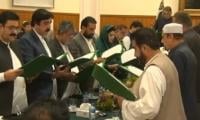ISLAMABAD: The majority verdict, authored by Justice Ejaz Afzal Khan, which is the judgment of the Supreme Court in the Panama case for enforcement, is a classic example of adjudicating this high-profile political matter while strictly sticking to the Constitution and law in letter and spirit.
For this exclusive reason, the ruling will be remembered and profusely referred to for many decades to come as some judges had rightly remarked during the proceedings.
At one point, it unambiguously noted that the fact that certain institutions may not be working up to satisfaction doesn’t confer a jurisdiction on the top court that is not available to it under the Constitution.
“Yes officers at the peak of NAB and FIA may not cast their prying eyes on the misdeeds and lay their arresting hands on the shoulders of the elites on account of their being amenable to the influence of the latter or because of their being beholden to the persons calling the shots in the matters of their appointment, posting and transfer. But it does not mean that this Court should exercise a jurisdiction not conferred on it and act in derogation of the provisions of the Constitution and the law regulating trichotomy of power and conferment of jurisdiction on the courts of law,” the judgment said in this connection.
It noted that any deviation from the recognized course would be a recipe for chaos. Having seen a deviation of such type, tomorrow, an accountability court could exercise jurisdiction under Article 184(3) and a trigger happy investigation officer while probing the case could do away with the life of an accused if convinced that the latter is guilty of a heinous crime and that his trial in the court of competent jurisdiction might result in delay or denial of justice.
According to the decision, courts of law decide the cases on the basis of the facts admitted or established on the record. Surmises and speculations have no place in the administration of justice. Any departure from such course, however well-intentioned it may be would be a precursor of doom and disaster for the society. It as such would not be a solution to the problem nor would it be a step forward. It would indeed be a giant stride nay a long leap backward. The solution lies not in bypassing but in activating the institutions by having recourse to article 190.
The judgment said that political excitement, political adventure or even popular sentiments real or contrived may drive any or many to an aberrant course but “we have to go by the law and the book. Let us stay and act within the parameters of the Constitution and the law as they stand, till the time they are changed or altered through an amendment.”
About the plea seeking disqualification of Prime Minister Nawaz Sharif under articles 62 and 63, the judgment said the bench would have sent this case to the Speaker or the Election Commission of Pakistan (ECP) but it does not think a question of such ineligibility has arisen as the premier has been alleged to be disqualified even on the nomination day on account of having failed to disclose his assets and those of his dependents.
The verdict said what the forums are provided by the Constitution and the law to deal with the questions emerging from articles 62 and 63. A careful reading of these provisions would reveal that the one deals with qualifications of a person to be elected or chosen as an MP while the other with disqualifications of a person not only from being elected or chosen but also from being an MP. If a candidate is not qualified or is disqualified from being elected or chosen as an MP, his nomination could be rejected by the Returning Officer (RO) or any other forum functioning in the hierarchy. But where the returned candidate was not, on the nomination day, qualified for or disqualified from being elected or chosen as a member, his election could be declared void by the Election Tribunal. While election of a member whose disqualification was overlooked, illegally condoned or went unquestioned on the nomination day before the RO or before the Election Tribunal, could still be challenged under the Constitution.
The verdict said that the expression “a court of law” has not been defined in Article 62 or any other provision of the Constitution but it essentially means a court of plenary jurisdiction, which has the power to record evidence and give a declaration on the basis of the proof. It would include a court exercising original, appellate or revisional jurisdiction in civil and criminal cases. But in any case a court or a forum lacking plenary jurisdiction cannot decide questions of this nature at least when disputed. When any question arises whether an MP has become disqualified it shall be dealt with only by the ECP on a reference from the Speaker.
While dealing with the alleged contradiction in the prime minister’s addresses, the ruling said that the mere contradiction between his speeches and statements of Hussain and Hassan does not prove any of his speeches false or untrue unless it is determined after examining and cross-examining both of them that their statements are correct and true. Where it is not determined that statements of Hussain and Hassan are correct and true, no falsity could be attributed to Nawaz Sharif’s speeches.
If at all, the premier’s speeches are sought to be used to incriminate him for declaring that he is not honest and “amen”, he has to be confronted therewith. Where no effort was made to prove the statements of Hussain and Hassan to be true and correct, nor was the premier confronted with his speeches, it would be against the cannons of law of evidence to use such speeches against him. Once we hold that neither of the speeches of Nawaz Sharif could be used against him, the question of availability of privilege under Article 66 shall become irrelevant.
According to the ruling, any allegation leveled against a holder of public office requires an investigation and collection of evidence showing that he or any of his dependents owns, possesses or has acquired assets disproportionate to his known means of income. Such investigation is followed by a full-fledged trial before an accountability court for determination of such liability. But where neither the investigation agency probed the case, nor any of the witnesses has been examined and cross-examined in an accountability court nor any of the documents incriminating the person accused has been produced and proved in accordance with the requirements of the law of evidence nor any oral or documentary pieces of evidence incriminating the person accused has been sifted, no verdict disqualifying a holder of public office could be given by the Supreme Court in a proceeding under Article 184(3) on the basis of a record which is yet to be authenticated.
The bench must draw a line of distinction between the scope of jurisdiction of the apex court under Article 184(3) and that of the accountability court under the NAB law and between the disqualifications envisioned by Articles 62 and 63 and Section 99 of the ROPA and the criminal liabilities envisioned by Sections 9, 10 and 15 of the NAB law lest we condemn any MP on assumptions by defying the requirements of a fair trial and due process.
“We cannot make a hotchpotch of the Constitution and the law by reading Sections 9 and 15 of the [NAB] Ordinance in Articles 62, 63 and Section 99 of the ROPA and pass a judgment in a proceeding under Article 184(3) which could well be passed by an accountability court after a full-fledged trial. Nor could we lift Sections 9 and 15 of the Ordinance, graft them onto Article 63, construe them disqualifications and proceed to declare that the member of Parliament so proceeded against is not honest and “amen” and as such is liable to be disqualified. A verdict of this nature would not only be unjust but coram non judice for want of jurisdiction and lawful authority. If a person is sought to be proceeded against under Section 9(a)(v) and 15 of the NAB Ordinance resort could be had to the mode, mechanism and machinery provided thereunder. Let the law, the Investigation Agency and the Accountability Court and other Courts in the hierarchy take their own course. Let respondent No. 1 go through all the phases of investigation, trial and appeal. We would not leap over such phases in gross violation of Article 25 which is the heart and the soul of the rule of law. We also don’t feel inclined to arrogate to ourselves a power or exercise a jurisdiction which has not been conferred on us by any of the acts of the Parliament or even by Article 184(3). Who does not know that making of a statement on oath in a trial lends it an element of solemnity; cross-examination provides safeguards against insinuation of falsehood in the testimony; provisions of Qanoon-e-Shahadat Order regulate relevancy of facts, admissibility of evidence and mode of proof through oral and documentary evidence and thus ensure due process of law. We for an individual case would not dispense with due process and thereby undo, obliterate and annihilate our jurisprudence which we built up in centuries in our sweat, in our toil, in our blood.”
Saad was of the view that the battle of politics should be fought solely through political means
KP govt decided to develop gemstone business as a formal export sector and cluster at the Namak Mandi would be...
Khyber Pakhtunkhwa Minister for Higher Education, Archives, and Libraries, Meena Khan Afridi. — APP FilePESHAWAR:...
Vehicles and horse carts passing through flood water at Bara Bazar area on Khuwani bridge after heavy rain in Peshawar...
Amid the failure to revive the cash-bleeding PIA, government is left with no other option but to sell it to any...
Picture showing the Silver Jubilee Gate of the University of Karachi. — APP File KARACHI: The University of Karachi...







